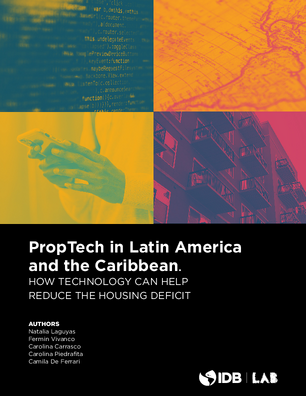Proptech in Latin America and the Caribbean: How Technology Can Help Reduce the Housing Deficit
Date
Sep 2022
Recognizing the widespread concern that disruptions created by technology have not yet benefited middle- and low-income households, this study explores the potential of PropTech to positively impact the housing challenges in the region, with a particular focus on the poor or vulnerable populations.
This study reveals several emerging trends that offer insight to those thinking about digital transformation in the housing and real estate sector for Latin America and the Caribbean and serve as the foundation for more research. PropTech startups are defined broadly as fast-growing actors that are developing technology-based business models for housing real estate markets. This includes companies operating on most phases of the housing value chain, from the housing units supply side (land, construction, access to services, and home improvement) to the demand side (financing, renting, buying, selling, and commercializing units).
PropTech startups mainly address two key issues in the traditional real estate market: lack of transparency and processes inefficiencies. Reducing costs and making information available equalizes the markets playing field. The opportunity for PropTech startups to develop business models that cover lower income brackets is still largely unexplored. Currently, profitable businesses are mostly serving high-income bracket groups. Thus, large-scale solutions that would make investing in the low-income segment profitable remain an opportunity for PropTech companies to target. Also, opportunities remain for startups to explore housing solutions that strengthen adaptation to climate change and curb harmful environmental impact through technology innovations through retrofitting efforts or the repurposing of existing units.
The report pays special attention to the different links in the value chain and highlights success stories that are having an impact on the current housing market, resulting in a snapshot of scalable, private-sector-led solutions currently deployed to solve pressing housing problems in the region.
This study reveals several emerging trends that offer insight to those thinking about digital transformation in the housing and real estate sector for Latin America and the Caribbean and serve as the foundation for more research. PropTech startups are defined broadly as fast-growing actors that are developing technology-based business models for housing real estate markets. This includes companies operating on most phases of the housing value chain, from the housing units supply side (land, construction, access to services, and home improvement) to the demand side (financing, renting, buying, selling, and commercializing units).
PropTech startups mainly address two key issues in the traditional real estate market: lack of transparency and processes inefficiencies. Reducing costs and making information available equalizes the markets playing field. The opportunity for PropTech startups to develop business models that cover lower income brackets is still largely unexplored. Currently, profitable businesses are mostly serving high-income bracket groups. Thus, large-scale solutions that would make investing in the low-income segment profitable remain an opportunity for PropTech companies to target. Also, opportunities remain for startups to explore housing solutions that strengthen adaptation to climate change and curb harmful environmental impact through technology innovations through retrofitting efforts or the repurposing of existing units.
The report pays special attention to the different links in the value chain and highlights success stories that are having an impact on the current housing market, resulting in a snapshot of scalable, private-sector-led solutions currently deployed to solve pressing housing problems in the region.




